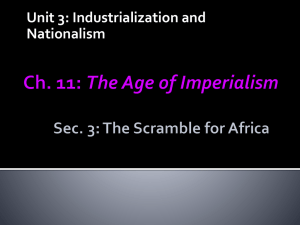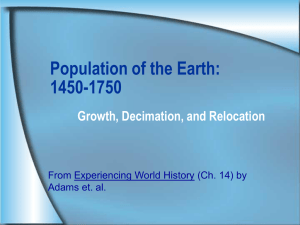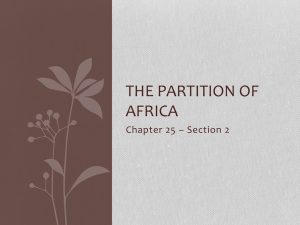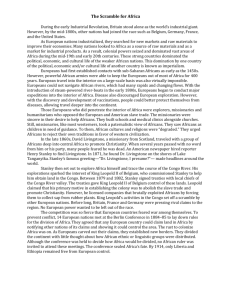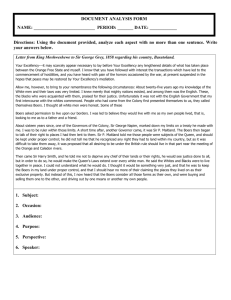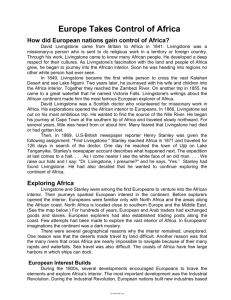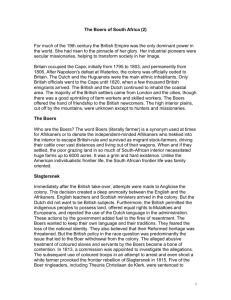CHAPTER 6, Section 2 “Lecture Notes” “A document was written
advertisement
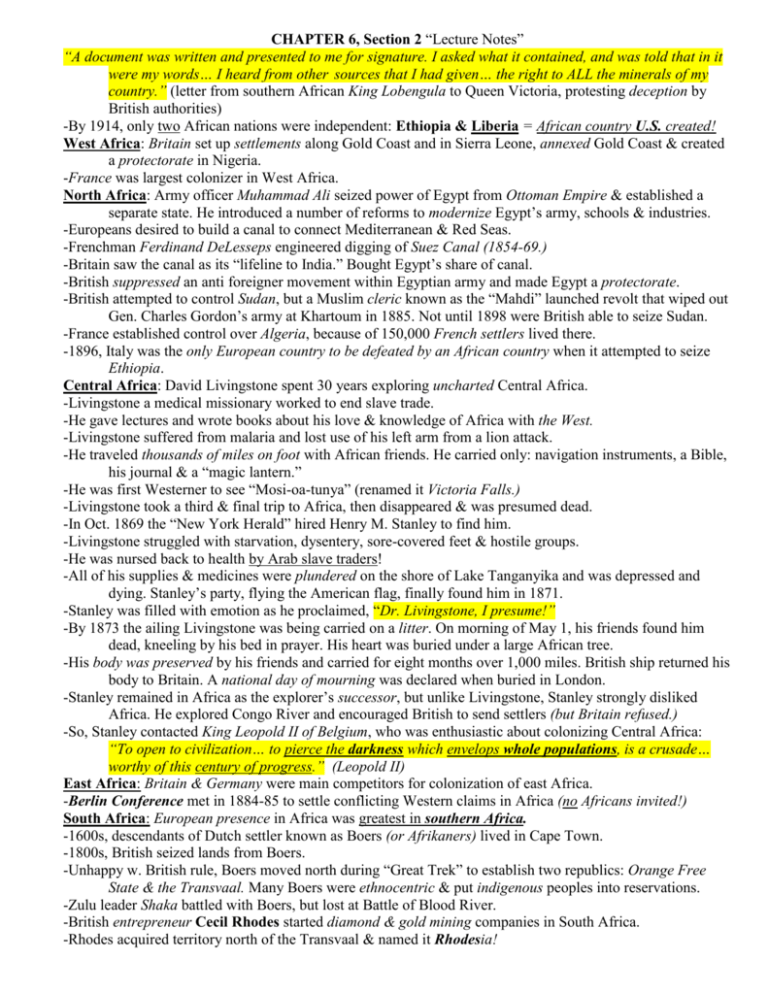
CHAPTER 6, Section 2 “Lecture Notes” “A document was written and presented to me for signature. I asked what it contained, and was told that in it were my words… I heard from other sources that I had given… the right to ALL the minerals of my country.” (letter from southern African King Lobengula to Queen Victoria, protesting deception by British authorities) -By 1914, only two African nations were independent: Ethiopia & Liberia = African country U.S. created! West Africa: Britain set up settlements along Gold Coast and in Sierra Leone, annexed Gold Coast & created a protectorate in Nigeria. -France was largest colonizer in West Africa. North Africa: Army officer Muhammad Ali seized power of Egypt from Ottoman Empire & established a separate state. He introduced a number of reforms to modernize Egypt’s army, schools & industries. -Europeans desired to build a canal to connect Mediterranean & Red Seas. -Frenchman Ferdinand DeLesseps engineered digging of Suez Canal (1854-69.) -Britain saw the canal as its “lifeline to India.” Bought Egypt’s share of canal. -British suppressed an anti foreigner movement within Egyptian army and made Egypt a protectorate. -British attempted to control Sudan, but a Muslim cleric known as the “Mahdi” launched revolt that wiped out Gen. Charles Gordon’s army at Khartoum in 1885. Not until 1898 were British able to seize Sudan. -France established control over Algeria, because of 150,000 French settlers lived there. -1896, Italy was the only European country to be defeated by an African country when it attempted to seize Ethiopia. Central Africa: David Livingstone spent 30 years exploring uncharted Central Africa. -Livingstone a medical missionary worked to end slave trade. -He gave lectures and wrote books about his love & knowledge of Africa with the West. -Livingstone suffered from malaria and lost use of his left arm from a lion attack. -He traveled thousands of miles on foot with African friends. He carried only: navigation instruments, a Bible, his journal & a “magic lantern.” -He was first Westerner to see “Mosi-oa-tunya” (renamed it Victoria Falls.) -Livingstone took a third & final trip to Africa, then disappeared & was presumed dead. -In Oct. 1869 the “New York Herald” hired Henry M. Stanley to find him. -Livingstone struggled with starvation, dysentery, sore-covered feet & hostile groups. -He was nursed back to health by Arab slave traders! -All of his supplies & medicines were plundered on the shore of Lake Tanganyika and was depressed and dying. Stanley’s party, flying the American flag, finally found him in 1871. -Stanley was filled with emotion as he proclaimed, “Dr. Livingstone, I presume!” -By 1873 the ailing Livingstone was being carried on a litter. On morning of May 1, his friends found him dead, kneeling by his bed in prayer. His heart was buried under a large African tree. -His body was preserved by his friends and carried for eight months over 1,000 miles. British ship returned his body to Britain. A national day of mourning was declared when buried in London. -Stanley remained in Africa as the explorer’s successor, but unlike Livingstone, Stanley strongly disliked Africa. He explored Congo River and encouraged British to send settlers (but Britain refused.) -So, Stanley contacted King Leopold II of Belgium, who was enthusiastic about colonizing Central Africa: “To open to civilization… to pierce the darkness which envelops whole populations, is a crusade… worthy of this century of progress.” (Leopold II) East Africa: Britain & Germany were main competitors for colonization of east Africa. -Berlin Conference met in 1884-85 to settle conflicting Western claims in Africa (no Africans invited!) South Africa: European presence in Africa was greatest in southern Africa. -1600s, descendants of Dutch settler known as Boers (or Afrikaners) lived in Cape Town. -1800s, British seized lands from Boers. -Unhappy w. British rule, Boers moved north during “Great Trek” to establish two republics: Orange Free State & the Transvaal. Many Boers were ethnocentric & put indigenous peoples into reservations. -Zulu leader Shaka battled with Boers, but lost at Battle of Blood River. -British entrepreneur Cecil Rhodes started diamond & gold mining companies in South Africa. -Rhodes acquired territory north of the Transvaal & named it Rhodesia! -Rhodes was an expansionist, “I think what God would like me to do is to paint as much of Africa British red as possible.” He wanted a chain of British colonies “from the Cape to Cairo.” -Boer War broke out between British & Boers from 1899-1902. -Boers resisted fiercely. British burned their crops and forced 120,000 women & children detention camps, where 20,000 died! -British won and in 1910 created independent Union of South Africa, a self-governing state within British Empire. But to appease Boers, only whites could vote! The White Man’s Burden, by Rudyard Kipling. “Take up the White Man’s burden- Send forth the best ye breed- To serve your captives needs: Half-devil and half-child…” The Black Man’s Burden, by Edward Morel. “It is the Africans who carry the ‘Black Man’s Burden’… the white man has massacred the African in heaps… Thus the African is really helpless against the material gods of the white man… in the trinity of: imperialism, capitalistic exploitation, & militarism.” -Indirect rule was mostly used in Africa. Westerners made all major decisions, but kept old ruling African elites in power. This excluded ambitious & talented young Africans. -Many African leaders were educated in Western schools, admired Western culture, but also resented Western arrogance & hypocrisy. -Colonialism caused most Africans to lose their farms & have to work on foreign-run plantations or factories. -Middle class Africans suffered less, but still paid less than Europeans. -Western clubs, schools and churches were segregated. -African nationalism emerged as indigenous people began organizing to end foreign rule. -Fatal disease malaria is spread by mosquitoes. European doctors learned from Indians of Peru to treat malaria with quinine (from bark of cinchona tree found in Andes Mountains!) -Europeans felt more secure about moving into Africa because of quinine.
